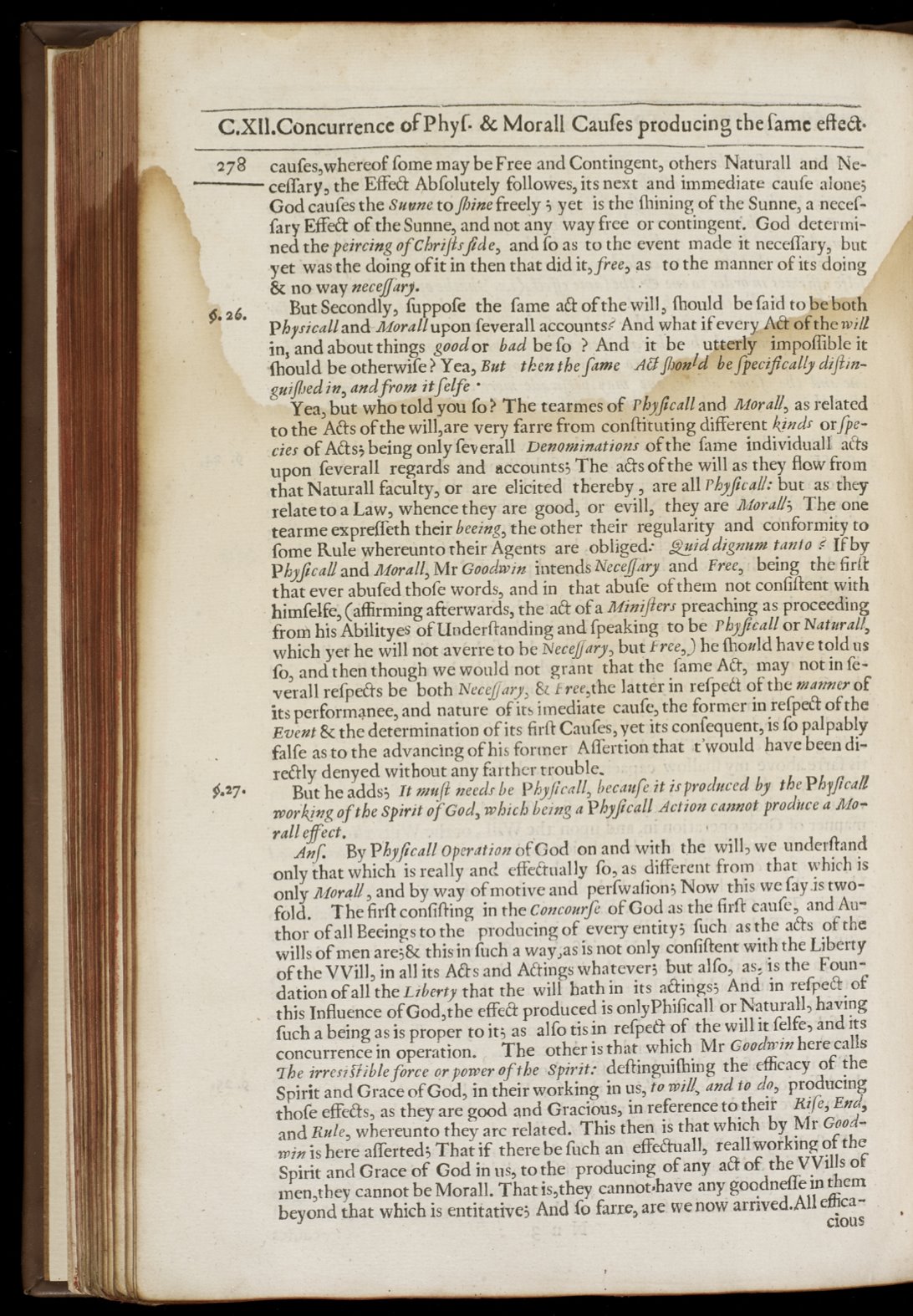

C.XILConcurrence
of
Phyl. &
Morall
Caufes
producing
the
fame
died.
278 caufes,whereof fome may
be
Free and Contingent, others
Naturall
and Ne-
ceffary,
the
Effeçt
Abfolutely followes,its next and immediate
caufe alone;
God
caufes
the
Sunne
to
Thine
freely ;
yet
is
the
finning
of
the
Sunne,
a
necef-
fary Effect
of
the
Sunne,
and not
any
way free or contingent. God
determi-
ned
the
peircing ofChriflsfade,
and
fo as
to
the event made
it
neceffary,
but
yet
was
the
doing
of
it
in
then
that
did it,free,
as
to the
manner
of
its
doing
&
no
way
neeef
ary.
ß,a6.
ButSecondly, fuppofe
the
fame
a&
of
the
will, thould
be
Paid
to
be
both
Ph
ysicalland-Morall
upon
feverall accounts? And what
if
every
A&
of
the
will
in, and
about
things goodor
bad
be
fo
?
And
it
be
utterly
impoffible
it
.should
be otherwife
?
Yea,
But
then
the
fame
.AEI
fbonld
be
fpecificallydiflin-
guifhed
in,
and
from
it
felfe
-
Yea,
but
who
told
you fo?
The
tearmes
of
Phyficall
and
Morall,
as
related
to
the
A&s
of
the
will,are very
fare
from
conftuting
different
kinds
or
fpe-
cies
of
A&s5
being only
fey
erall
Denominations
of
the
fame
individual)
a&s
upon
feverall
regards
and accounts;
The
a&s
of
the
will
as
they
flow
from
that
Naturali faculty,
or
are elicited
thereby
,
are
all
Phyficall:
but
as
they
relate
to
a Law, whence they are good, or evill, they are
Morall;
The
one
tearme
expreffeth
their
beeing,
the other their
regularity and conformityto
fome
Rule
whereunto
their
Agents are
obliged:
quid
drgnum
tanto
?
If
by
Phyficall
and
Morall,
Mr
Goodwin
intends
Neceffary
and
Free,
being
the
firft
that
ever abufed thofe words, and
in
that
abufe
of
them not
confiftent
with
himfelfe,
(affirming
afterwards,
the
a&
of
a
Miners
preaching
as
proceeding
from
his
Abilityes
of
Llnderttanding
and
fpeaking
to
be
Pbyficall
or
Natural!,
which
yet he
will
not averre to he
Neceffary,
but
Free,) he íhould
have told
us
fo,
and then though we would not
grant
that
the
fame Aft, may not
in
fe-
verall
refpe&s
be both
Necefjary,
8t Free,the
latter.
in refpeét
of
the
manner
of
its performance, and nature
of
its
imediate
caufe,
the
former
in refpe&
of
the
Event &
the
determination
of
its firft Caufes,
yet
its
confequent,
is
fo
palpably
falfe
as
to
the
advancing
of
his
former
Affertion
that t'would
have been di-
rely
denyed without
any
farther
trouble_
4.27
But he adds;
It
muff needs
be
Phyficall,
becaufe
it
isproduced
by
the Phyficall
working
of
the Spirit
of
God,which
being
a
Phyficall Action cannot
produce a
Mo-
rall
effect.
,Anf.
By
Phyficall
Operation
of
God on and with the will,
we
underftand
only
that
which
is
really
and
effe&ually
fo,
as
different from
that
which is
only
Morall
, and by
way
of
motive and
perfwafion;
Now
this
we
fay
is
two-
fold.
The
firft confifting in
the
concourf
e
of
God
as
the
firft
caufe, and
Au-
thor of
all Beeings
to the
producing
of
every
entity;
fuch
as
the
a&s
of
the
wills
of
men are;&
this
in fuch
a
way;as
is
not
only confiftent with
the
Liberty
of
theVVill,
in
all its A&s
and
A&ings
whatever;
but
alto,
as,
is
the
Foun-
dation
of
all
the
Liberty
that
the
will
bath
in
its a&ings;
And
in
refpe&
of
this
Influence
ofGod,the
effeft
produced
is
onlyPhificall
or Natural!,
having
fuch a being
as is
proper to it;
as
alto
tisin
refpe&
of
the
will
it
felfe,
And
its
concurrence
in
operation.
The
other
is
that
which
Mr
Goodwin
here
calls
The
irresi
flible
force or
power
of
the
spirit:
deftinguithing
the
efficacy
of
the
Spirit and Grace
of
God,
in
their working
in us,
to will,
and
to
do,
producing
thofe
effe&s,
as
they are good and Gracious,
in
reference
to
their
R?fe,
End,
and
Rule,
whereunto they arc related. This then
is
that
which by Mr
Good-
win
is
here
affected;
That
if
there
be
filch an effe&uall,
reali working
ofthe
Spirit
and Grace
of
God
in
us,
to
the producing
of
any
aft
of
the
VVills
of
men,they
cannot be Morall.
That
is,they
cannothave
anygoodneffe
in
them
beyond
that
which
is
entitative;
And
fo
farce, are
we
now arrived.All
effica-
cious










